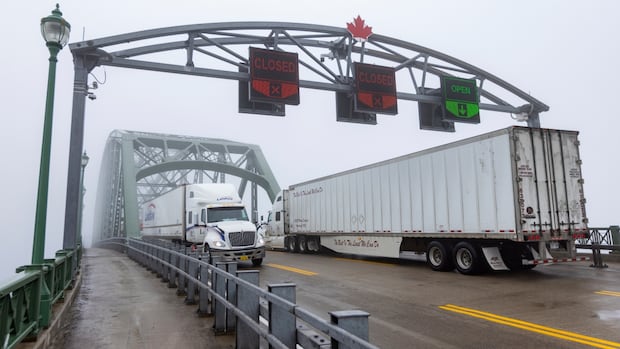Donald Trump says he wants to see more vehicles made in America. It’s a handy slogan and might once have been a viable idea.
The problem is there’s no such thing as a Made in America car anymore. And there hasn’t been for years.
Since Canada and the U.S. signed the Auto Pact in 1965, auto manufacturers have leveraged the comparative advantage in both countries to make the industry more competitive, production more efficient and vehicles more affordable.
Experts say tariffs would effectively undo those advantages almost immediately.
“It’s the same Trump nonsense that is not backed by paperwork that is going to hurt [the] American auto industry worse than it will hurt Canada,” said Flavio Volpe, head of the Automotive Parts Manufacturers’ Association (APMA).
A case study
Any vehicle made in North America is manufactured via a complex web of interconnected supply chains that use raw materials and parts suppliers that span the entire continent.
Consider the rear assembly of a car made in North America.
That graphic was put together by the APMA. It says it’s based on its members’ actual contracts. Company names were redacted to respect competitive confidentiality.
Each dot represents a different company providing the material or part required to complete the rear assembly.
To break the process down even further, everything starts as raw material in one country, is shaped into a part in another, then moved again to be assembled into a broader component, before finally being assembled and eventually shipped to a customer.
Rubber is processed in Monterrey, Mexico. It’s shaped into a connector in Iowa. That piece fits into the control arm assembly made in Brampton, Ont. The control arm is put together as part of the rear suspension assembly in Detroit. The rear assembly is shipped to Windsor, Ont., for final assembly and eventually sold in California.
The new NAFTA
You could draw up a similar chain for each individual part in any car.
The whole process is only doable when those components can move across borders tariff-free.
That was a key component of the renegotiated North American Free Trade Agreement in 2018. When it was announced, Trump heralded the newly signed Canada-United States-Mexico Agreement as a breakthrough for the American auto industry.
“Once approved, this will be a new dawn for the American auto industry and for the American autoworker,” said Trump in 2018.
And yet, as he announced his latest tariff salvo, Trump’s proclamation essentially declared his own trade deal a failure.
“I am also advised that agreements entered into before the issuance of Proclamation 9888, such as the revisions to the United States-Korea Free Trade Agreement and the United States-Mexico-Canada Agreement (USMCA), have not yielded sufficient positive outcomes,” wrote the administration.
But undoing the status quo will come with enormous cost.
“No car is truly made in just North America,” said Patrice Maltais from the industry association Global Automakers Canada.
He says…
Read More: Is there such a thing as a Made in America car anymore?




